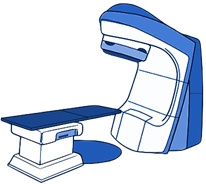What is Radiotherapy for Prostate Cancer?
Radiation therapy, also called radiotherapy, is one of the main treatments for cancer.
Radiation therapy is a safe and effective treatment for prostate cancer and is designed to destroy or injure cancer cells so they cannot multiply.
Why is Radiation Therapy Used?
The aim of radiation therapy is to:
- Cure the cancer- some prostate cancer can be cured by radiation therapy alone or combined with other treatments.
- Control of prostate cancer- radiation therapy can control some cancers by making them smaller or stopping them from spreading.
- Relieve symptoms- if a cure is not possible, radiation therapy may be used to reduce cancer symptoms and prolong a good quality of life.
How does Radiation Therapy Work?
 Radiotherapy involves the controlled application of radiation to the cancer cells using high-energy x-rays, gamma rays, electron beams or protons to kill cancer cells using a machine called a 'Linear Accelerator'.
Radiotherapy involves the controlled application of radiation to the cancer cells using high-energy x-rays, gamma rays, electron beams or protons to kill cancer cells using a machine called a 'Linear Accelerator'.
Focusing the radiation on the area to be treated reduces the impact of treatment on healthy areas of the body. Cancerous cells are more susceptible to radiation than healthy, non-cancerous cells and while normal cells can also be damaged they usually recover.
Types of Radiation Therapy for Prostate Cancer
There are two main types of Radiation Therapy:
Are You a Candidate for Radiation Therapy?
In general, radiotherapy is suitable if the cancer is still in the prostate gland and has not spread to other areas of the body.
A number of tests will be carried out to see if radiation therapy will help, including:
- Checking pathology reports
- PSA Test
- Chest X-ray
- CT scans of abdomen and pelvis
- Bone scans
- PSMA PET scans
Radiotherapy Planning for Prostate Cancer
Treatment is individually tailored to improve efficacy, relieve symptoms and to limit side effects.
The radiation therapy involves three steps and is designed to help the radiation therapy team plan and work out the best way to deliver the treatment to your prostate while limiting radiation to the bowel and bladder.
Simulator Planning Session
A catheter is placed into the penis and rectum and small amounts of dye are put into these to help find the exact position of your prostate gland (this can vary between men).
- Measurements are taken by X-rays from the front and side while lying face down.
- Small marks are made for targeting.
- It is important to try not to empty your bladder beforehand.
- This procedure requires no special preparation and is not painful.
Planning CT Scan
This takes place about a week after your simulator planning session and is similar.
- The CT scan takes pictures of the prostate gland
- It is important to try not to empty your bladder beforehand, but
- No catheters are used
Treatment Plan
The radiation therapy team will use the information collected during your simulator planning session and planning CT scan to work out the best way to deliver your treatment.
Side Effects
The bowel and bladder lie next to the prostate gland and during radiotherapy, some of the normal cells of the bowel or bladder may be damaged due to their proximity to the prostate.
Although care is taken so that radiation does not affect these areas, sometimes it is unavoidable.
Short-term side effects may include:
- A burning feeling when urinating or the need to urinate more often.
- Bowel movements may become looser and more frequent, and there may be spots of blood and discomfort when emptying the bowel.
- Many people may also feel a loss of energy and increased lethargy during radiation therapy but this should remedy soon after treatment.
- For most people side effects settle down within a month of completing treatment, although it may prolong for some.
Long-term side effects may include:
- A small number of men may develop long term complications from radiation therapy such as frequent rectal bleeding or other bowel problems.
- Some men may find that treatment affects their sexual function, including erectile dysfunction and discomfort or a lack of fluid during ejaculation.
- Side effects of radiation therapy differ between men and so it is impossible to determine who will have what side effects.
- If you suffer any side effects, it is important you let your doctor know as soon as possible so that appropriate help can be given.
Resources are available to help manage any side effects experience.




